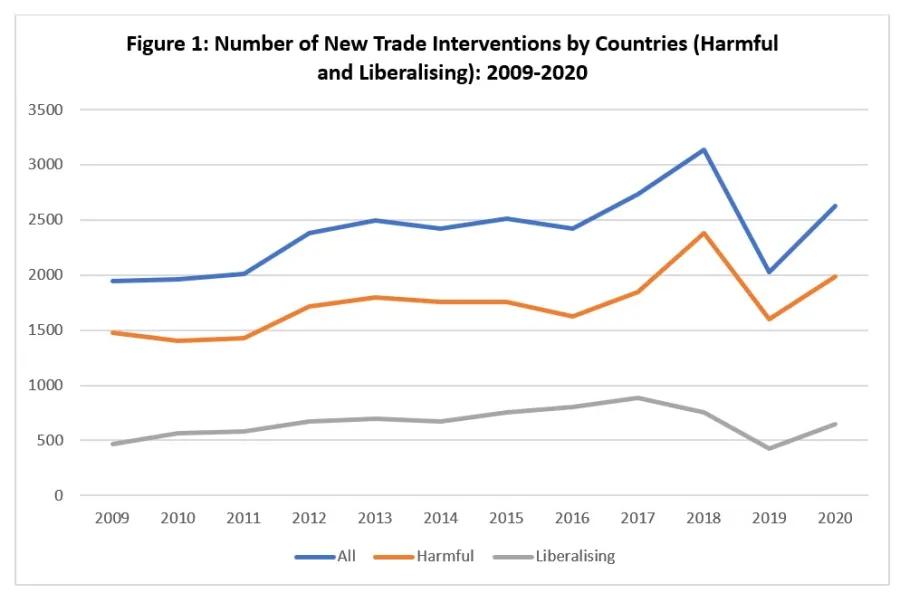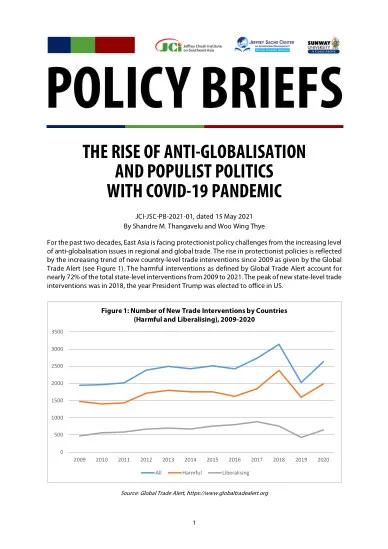The Rise of Anti-Globalisation and Populist Politics with COVID-19 Pandemic
Publication date: 15 May 2021 | Length of brief: 4 pages | Serial Number: JCI-JSC-PB-2021-01
For the past 2 decades, East Asia is facing protectionist policy challenges from the increasing level of anti-globalisation issues in regional and global trade. The rise in protectionist policies is reflected by the increasing trend of new country-level trade interventions since 2009 as given by the Global Trade Alert (see Figure 1). The harmful interventions as defined by Global Trade Alert accounts for nearly 72% of the total state-level interventions from 2009 to 2021.[1] The peak of new state-level trade interventions was in 2018, the year President Trump was elected to office in US.

At that time, President Trump had been in office for over a year, which led to a shift in the US trade policy towards more inward-oriented strategies (Qi and Wing, 2020; Bown and Irwin 2019). By March 2017, the UK has already begun work on its withdrawal strategies from the EU. Other important global trade issues included instances of the application of protectionism (Evenett and Fritz 2019), as well as problems in APEC processes [2] and in the WTO (Bown and Keynes 2020), and increased bilateral tensions between the US and China. By mid 2019, The Economist was arguing that trade tensions were compounding a shift that had been underway since the financial crisis in 2008-09 and that globalisation had given way to a new era of sluggishness which they called “slowbalisation”.
The other significant global event is the COVID-19 pandemic shock in early 2020 that disrupted key economic activities within and between countries and regional and global trade and investment. The key dimension of the COVID-19 pandemic shock is the diversion from open economic policies to more inward-looking policies.
A recent study by Rodrik highlights the shifts in behaviour and attitudes towards trade and foreign investments. The link is often made from those changes in attitudes to trade with the growth of populist political movements. Rodrik (2018) says that populism has not ‘come out of nowhere’, but it is ‘on the rise’ and that support has doubled in the last two decades. But he says populist movements are the political backlash to the ‘advanced stages of globalisation’.
Several key factors have direct impact on the behaviour of people against globalisation and trade.
- Gains from trade are unevenly distributed and biased against the unskilled. A study by UNCTAD (2013) shows that there is uneven distribution of gains from trade in India. Although trade increases the wages of unskilled workers, the study observed that 70% of the income generated from trade is going to only the top two income groups. The study also highlights that the impact of trade on wages is also dependent on the export-intensity of the industries. Firms that are less skilled and labour-intensive such as the textiles and agricultural sectors tend to experience less gains from trade in terms of wage increases for the unskilled and less educated (UNCTAD, 2013).
- As trade increases growth in more open economies, these countries have also concurrently experienced a widening wage gap (between skilled and unskilled) and the polarisation of semi-skilled jobs (Thangavelu and Wang, 2021). In recent years, ASEAN member countries experienced large declines in the share of semi-skilled jobs (mostly white-collar jobs) as compared to unskilled and skilled jobs in Australia, India, Indonesia, Korea, New Zealand, Malaysia, the Philippines, and Thailand. There is also a widening gender gap as trade drives growth in the East Asian region. This has a direct impact on the incomes and wealth of middle-income households.
- As trade increases growth, we are also experiencing rising business impediments and greater state-level interventions. In most cases, larger enterprises have more access to finance and foreign markets than local SMEs. The need for skilled workers, government regulations, and access to finance are the key impediments facing local enterprises to fully participate in the open economy. Although larger companies have better access to regional and global markets, the rise in state-level trade interventions in recent years have also affected their investment in markets and technologies overseas.
- Over the past two decades, East Asia has experienced massive movements of skilled and unskilled workers, especially the international mobility of the latter group. The impact of international labour mobility has direct impact on the wages of unskilled workers and also on the sovereign identities of local people
- Trade has a more direct impact on the incomes and wealth of tradable sectors in urban centres compared to rural centres, hence creating a rural-urban divide and growth tensions between the rural and urban population.
The COVID-19 pandemic shock will also increase and intensify the vulnerability of openness and induce more inward-looking policies. The uneven growth impact from the pandemic shock on unskilled workers and the increasing digitalisation of the economy will widen the welfare gap between the skilled and unskilled in the economy (World Bank, 2021).
The key to managing the rising tide of anti-globalisation against trade in East Asia is to recognise the real impacts of trade in the domestic economy and the region. The balancing of trade gains with inclusive growth will be the key policy challenge for East Asia as the intensity of anti-trade populism increases in East Asia. The importance of regional cooperation under ASEAN and APEC and multilateral trade arrangements such as the RCEP (Regional Comprehensive Economic Partnership) in balancing sustainable and inclusive growth from trade will be fundamental to manage the impacts of globalisation in the region.
[1] Global Trade Alert defines the following: (a) Red triangle: The intervention almost certainly discriminates against foreign commercial interests. (b) Amber triangle: The intervention likely involves discrimination against foreign commercial interests. (c) Green triangle: The intervention liberalises on a non-discriminatory (i.e., most favoured nation) basis; or improves the transparency of a relevant policy.
[2] https://www.abc.net.au/news/2018-11-18/apec-leaders-fail-to-agree-on-communique-wording/10508974
References
Baldwin, Richard and Simon Evenett, 2020, COVID-19 and Trade Policy: Why Turning Inward Won’t Work, A CEPR Press VoxEU.org eBook
Bown, C.P. and Keynes, S., 2020. Why Trump shot the sheriffs: The end of WTO dispute settlement 1.0. Journal of Policy Modeling.
Bown, C.P. and Irwin, D.A., 2019. ‘Trump’s Assault on the Global Trading System: And Why Decoupling from China Will Change Everything’ Foreign Affairs, 98, p.125
Qi Ren Kok, Derek and Wing Thye Woo (2020) The wide range of national reactions to the common COVID-19 shock: observations on causes and effects, Journal of Chinese Economic and Business Studies, 18:4, 379383. DOI: 10.1080/14765284.2020.1855928
Evenett, Simon and Johannes Fritz, 2019, ‘Going It Alone? Trade Policy After Three Years of Populism: The 25th Global Trade Alert Report’, https://www.globaltradealert.org/reports
Kimura, Fukunari, Shandre Mugan Thangavelu, Dionisius Narjoko and Christopher Findlay, 2020, ‘Pandemic (COVID-19) Policy, Regional Cooperation and the Emerging GlobalProduction Network’, Asian Economic Journal, 34(1).
Thangavelu, S.M. and Wenxiao Wang, 2021. “Skills and Human Capital Development Policies of ASEAN’ in Fukunari Kimura, Mari Pangestu, Shandre Thangavelu and Christopher Findlay (eds), Handbook on East Asian Integration, Edward Elgar, Cheltenham, 2021, forthcoming.
UNCTAD, 2013. “How are the poor affected by International Trade in India: An Empirical Approach”, United Nations, New York.
World Bank. 2021. “Uneven Recovery” East Asia and Pacific Economic Update (April)”, World Bank, Washington, DC. Doi: 10.1596/978-1-4648-1702-1
Author(s)
The JCI-JSC Working Paper series is published to disseminate preliminary research findings and stimulate intellectual discourse on wide-ranging public policy issues, ranging from security to sustainability. The views expressed herein are those of the author(s) and do not necessarily reflect the views of the Jeffrey Cheah Institute on Southeast Asia and the Jeffrey Sachs Center on Sustainable Development.




